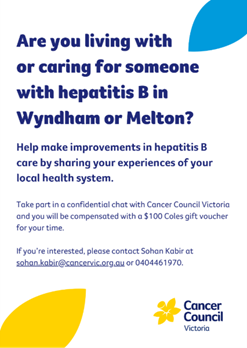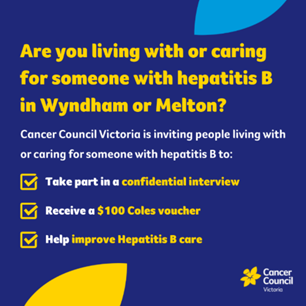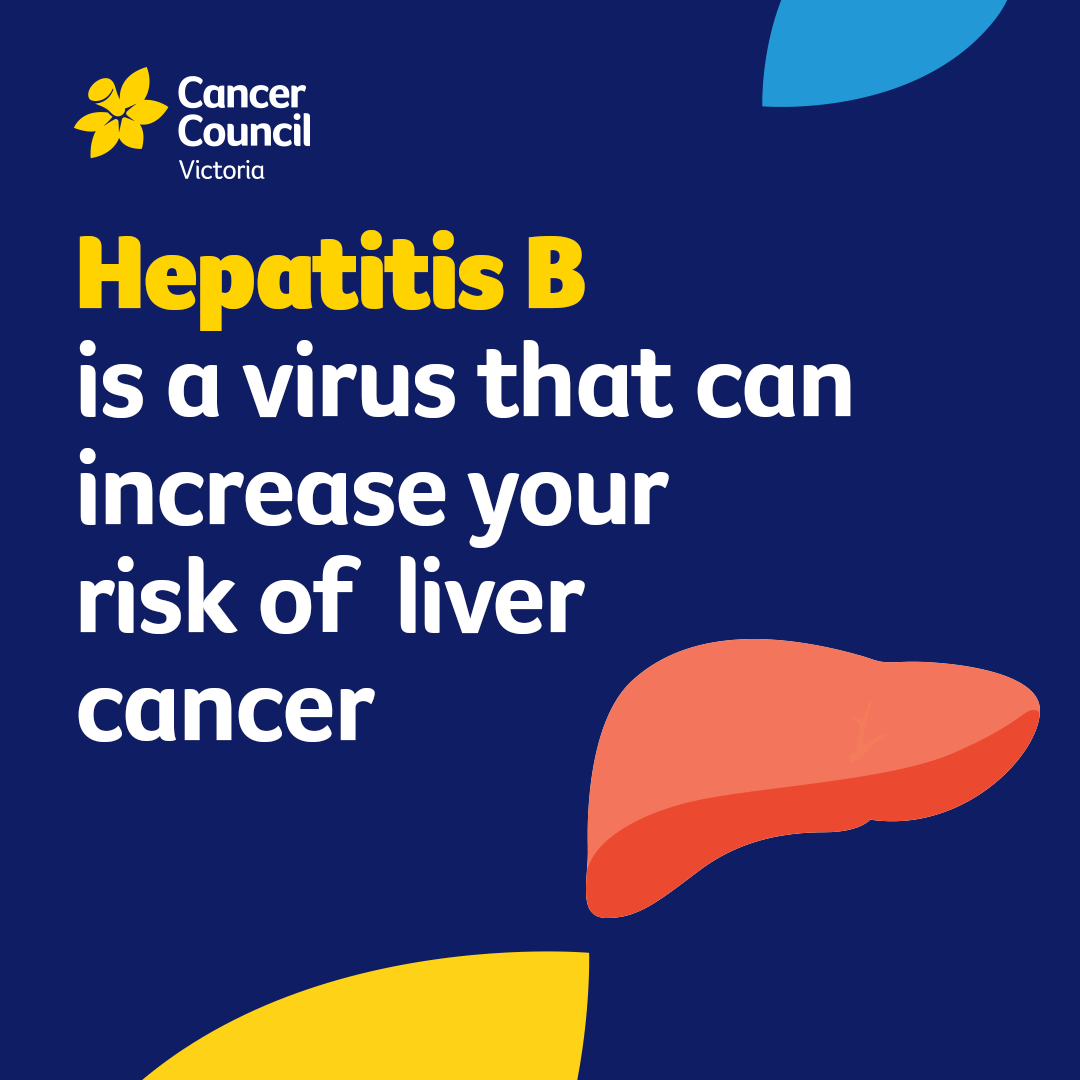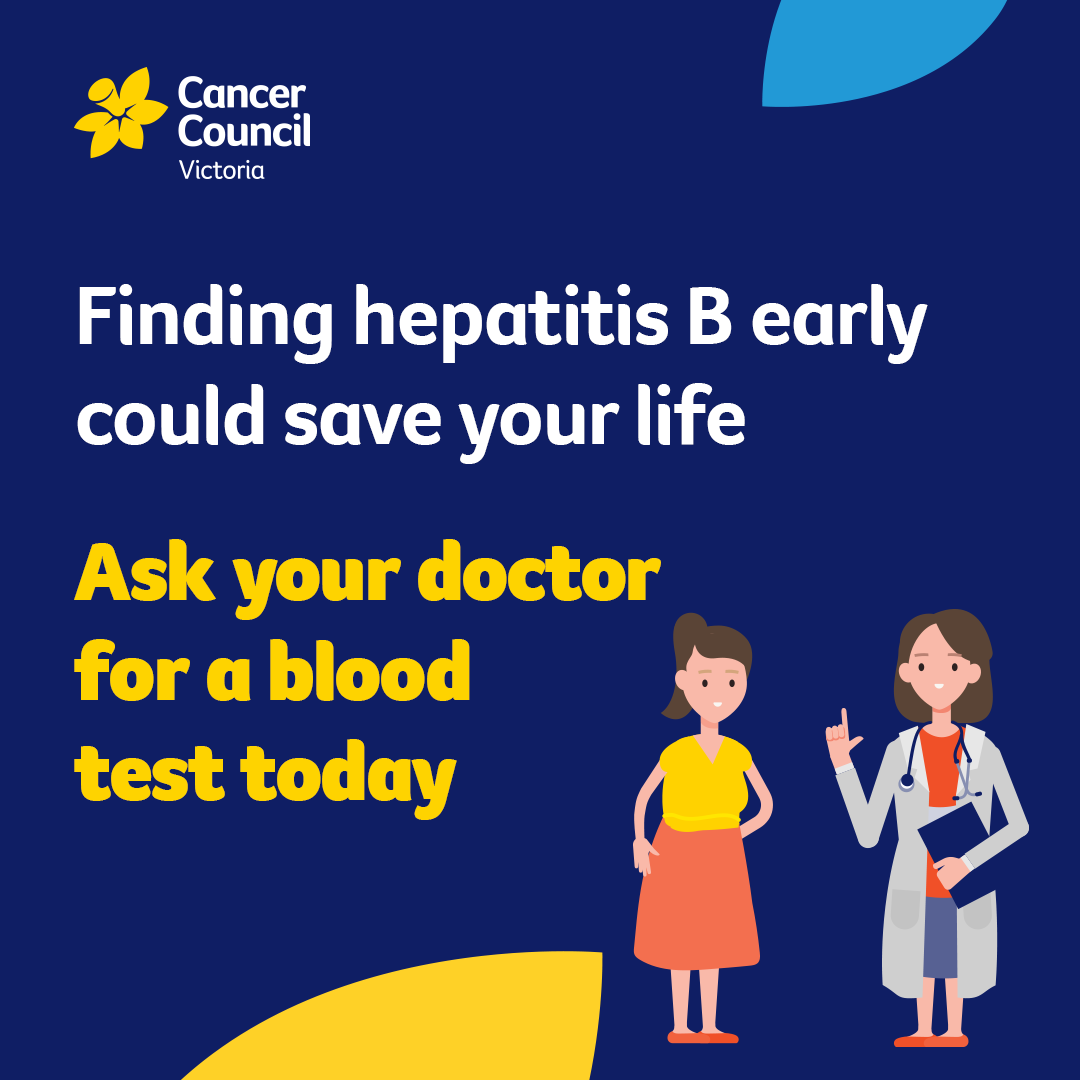Eliminating hepatitis B and preventing liver cancer in Wyndham
Increase awareness of hepatitis B and the importance of testing and care to prevent liver cancer in Wyndham.What is hepatitis B and how is it linked to liver cancer?
- Hepatitis B (HBV) is a virus that affects the liver. A simple blood test can detect it.
- If undetected and unmanaged, long-term infection with hepatitis B can lead to liver damage, cirrhosis, and liver cancer.
- Vaccination prevents hepatitis B. In Australia, all babies are offered the vaccine at birth since 2000.
- Mother-to-child transmission at birth is the most common cause of long-term hepatitis B infection. People born in places where hepatitis B is common such as in parts of Asia, Africa, Southern Europe or the Pacific, and/or where the hepatitis B vaccine is not universally available at birth are at increased risk.
- Over 200,000 Australians live with hepatitis B.
- With regular monitoring, people with hepatitis B can live long, healthy lives.
- Monitoring usually includes a blood test, and sometimes an ultrasound.
- Many people have no symptoms. A blood test is the only way to know if the virus is “asleep” or “awake” and attacking the liver.
- It also helps the doctor work out if the patient requires medicine to keep them well. Without care, up to 1 in 4 people with hepatitis B may develop serious liver disease or liver cancer.
Find out more about hepatitis B and liver cancer on the Cancer Council Victoria website.
Why is this an issue in Wyndham?
- Wyndham is home to many culturally and linguistically diverse (CALD) communities, including communities from regions where hepatitis B is more common.
- Local data shows that Wyndham has one of the highest prevalence rates of hepatitis B in Victoria. Around 3100 people live with hepatitis B in Wyndham, and almost 75% are not linked to clinical care.
- Community awareness, stigma, and barriers to healthcare access can make it difficult for people to get tested, monitored, or treated.
- Without coordinated action, many people in Wyndham remain at risk of developing liver cancer due to unmanaged hepatitis B.
What is this project about?
The Wyndham project will focus on working with local community leaders and health providers to:
- Increase access to clinical care (regular monitoring) and treatment for residents living with hepatitis B.
- Increase testing and diagnosis for people who are at risk of hepatitis B.
- Reduce stigma and increase community awareness.
How you can help
Together, we can eliminate hepatitis B and help prevent liver cancer. By working together across council, community, and health sectors, we will save lives, reduce health inequalities, and create a healthier future for all residents.
Your voice and action matter. Thank you for being part of this important journey.
Here are some of the ways you can play a vital role in making elimination possible:
As a community leader
- Join our community consultations and help shape solutions with people affected by hepatitis B.
- Invite us to speak at your community events about hepatitis B and liver cancer.
- Help spread the word—share accurate information, reduce stigma, and encourage testing.
- If you would like to get involved in this project by being part of consultations, providing peer support or improving patient navigation, get in touch with Sohan Kabir at sohan.kabir@cancervic.org.au or 0404 461 970.
As a healthcare provider
- Book a free education session for your clinic with a viral hepatitis nurse educator.
- Consider becoming a hepatitis B treatment provider by attending the S100 course. Contact us if you are interested in finding out more about the S100 prescriber program.
- Join our consultation to help improve care for patients with hepatitis B.
Help recruit people living with or caring for people with hepatitis B
Cancer Council Victoria is inviting people living with or caring for someone with hepatitis B in Wyndham to share their experiences of their local health system.
By taking part in a confidential interview, you can help improve hepatitis B care and will receive a $100 Coles gift voucher as a thank you for your time.
For more information, please contact Sohan Kabir at sohan.kabir@cancervic.org.au or 0404 461 970.
Messages to promote through your networks
Help raise awareness about hepatitis B and its connection to liver cancer through your communication channels or social media using the suggested copy and tiles below. We really appreciate your support.
Key messages
- Hepatitis B is a virus that can affect your liver, and if left undetected and unmanaged can increase your risk of liver cancer.
- Hepatitis B can be detected through a simple blood test.
- Many people with hepatitis B do not have any symptoms, so it’s important to ask your doctor for a blood test to look for hepatitis B.
- Finding hepatitis B early could save your life.
- Ask your doctor for a blood test today.
- If you’ve been diagnosed with hepatitis B but are not currently receiving care, speak to your doctor.
- With regular check-ups, people with hepatitis B can live healthy lives and reduce the risk of liver cancer.
Newsletter/website content
Headline: Talk to your doctor about hepatitis B and reduce your risk of liver cancer
Hepatitis B is a common virus affecting millions of people around the world. With regular care, people with hepatitis B can live healthy lives. However, if not detected or managed, it can affect your liver and increase your risk of liver cancer.
Wyndham has one of the highest rates of hepatitis B in Victoria, with nearly 3,100 residents estimated to be living with the virus. and three out of four people are not receiving care. Some may not even know they have it, and most (75%) of people living with it are not receiving clinical care to prevent liver damage.
People born in places where hepatitis B is common such as in parts of Asia, Africa, Southern Europe or the Pacific, and/or where the hepatitis B vaccine is not universally available at birth are at increased risk.
Many people with hepatitis B don’t have any symptoms, so it is important to see your GP for a blood test to check if you have the virus. It is important to also see your doctor regularly if you know you have hepatitis B. Only a blood test can tell if the virus is “asleep” or “awake” and potentially harming your liver.
You can learn more about hepatitis and its link to liver cancer, on Cancer Council Victoria’s website.
You can also speak to Cancer Council Victoria’s experienced nurses on 13 11 20.
Social media posts
Post 1
Hepatitis B is a virus that can affect your liver and can increase your chances of liver cancer.
Hepatitis B can be treated, but if left unmanaged, can increase the risk of liver cancer.
If you've been diagnosed with hepatitis B and are not currently receiving care, speak to a doctor today.
Learn more: www.cancervic.org.au/cancer-information/screening/hep-b-liver-cancer
@cancervic
Post 2
A simple blood test can find hepatitis B early.
Hepatitis B is a virus that can increase your risk of liver cancer. But when found early, hepatitis B can be managed and treated before it can damage your liver.
Book in today to speak to one of our doctors on YOUR CLINIC’S PHONE NUMBER.
Learn more: www.cancervic.org.au/cancer-information/screening/hep-b-liver-cancer
@cancervic
Email banner

Use this banner in your email signature.




